Revealed: How Ofsted reports show shifting focus for schools
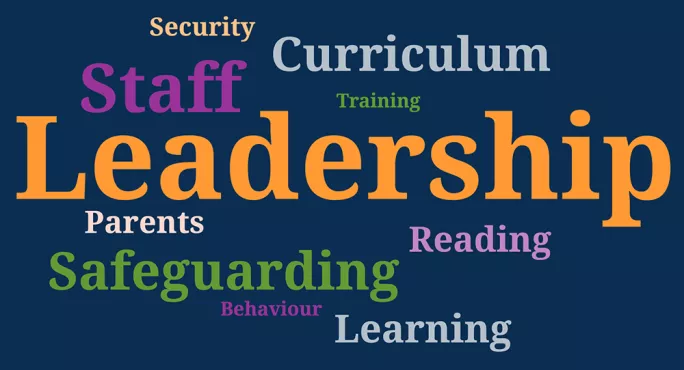
A new analysis of Ofsted school inspection reports has given a unique insight into the changing focus of the inspectorate since 2006.
The investigation, by SchoolDash, tracks how often selected topics are mentioned per 1,000 words in reports for each month over the past 16 years.
Below are the most important findings for school leaders from data collected from around 170,000 reports.
1. The rise and rise of curriculum
The most obvious, and perhaps least surprising, change is the rise in mentions of “curriculum” in Ofsted inspection reports.
The SchoolDash data highlights how the use of the word “curriculum” in school reports has increased more than tenfold since a low point in 2014.
The sharpest increase is seen after September 2019 - when Ofsted introduced its new Education Inspection Framework, which placed a new emphasis on the curriculum and a reduced focus on a school’s exam and test results.
The framework introduced a new quality-of-education judgement, which means Ofsted inspectors assess a school’s curriculum intent, implementation and impact.
Inspectors also attempt to assess how the curriculum is delivered in individual subjects by carrying out so-called “deep dives” into particular subjects.
The SchoolDash graph below shows the recent increase in the use of the word “curriculum” in Ofsted school inspection reports:
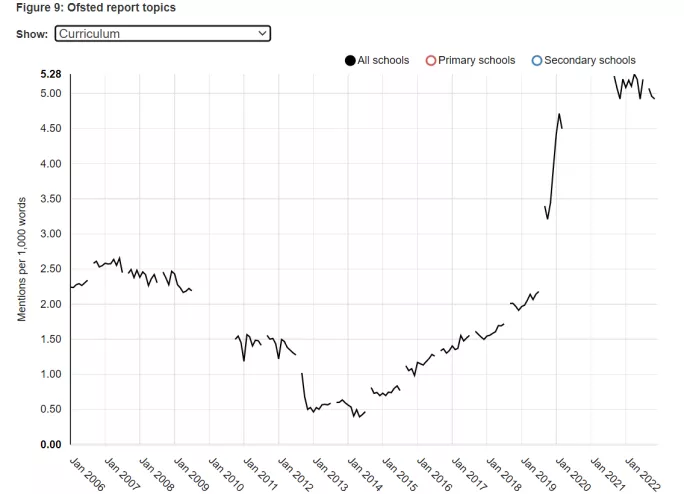
Interestingly, the increased mention of “curriculum” in inspection reports predates the launch of Ofsted’s latest framework.
The SchoolDash data shows that mentions of “curriculum” declined from July 2007, when it was mentioned 2.2 times per 1,000 words in reports that month.
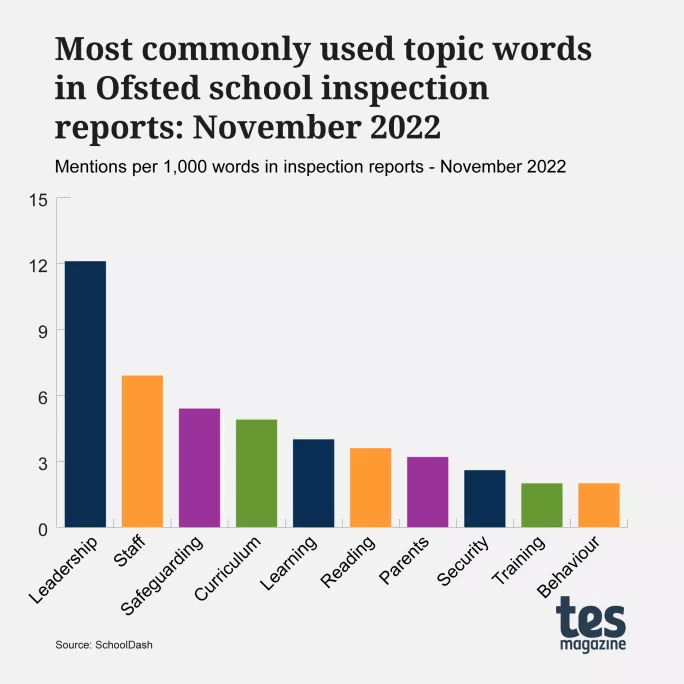
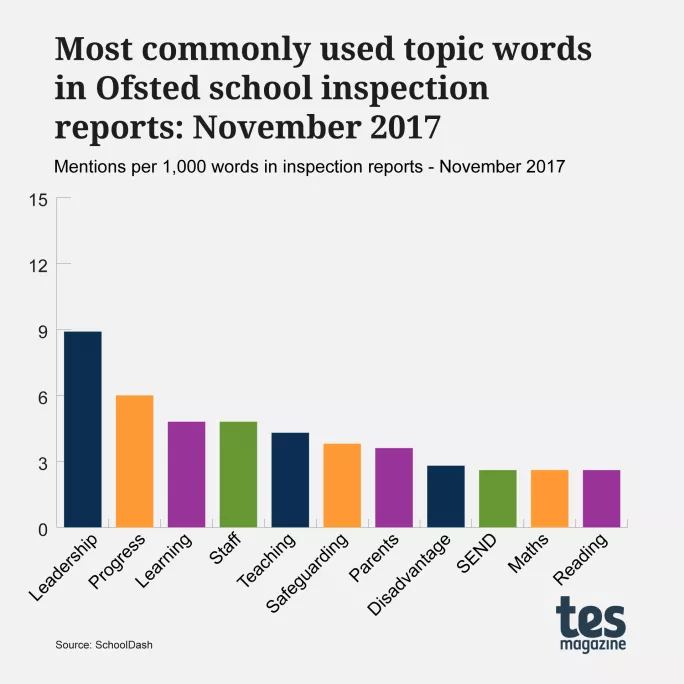
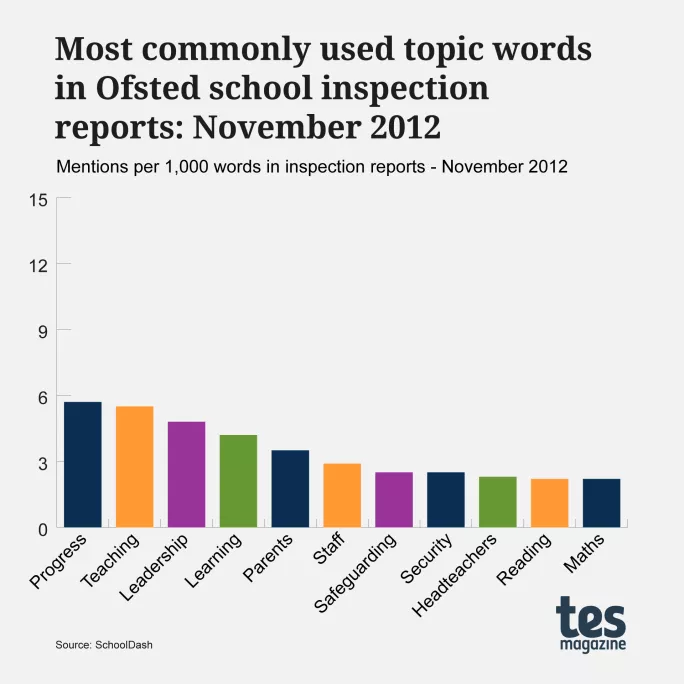
The figure then dropped to 0.4 mentions by May 2014 before climbing up to 2.2 mentions by July 2019 in the summer before the new framework was launched.
But with the launch of the Education Inspection Framework, it then leapt again to a high point of 5.3 mentions per 1,000 words by April 2022.
2. The decline of attainment and assessment
When Ofsted launched its Education Inspection Framework, it said that the quality-of-education judgement would bring an increased emphasis on curriculum and a reduced focus on exam and test results.
The SchoolDash analysis shows that mentions of both attainment and assessment have declined since the framework was launched.
From 2015 to 2019, “assessment” was consistently mentioned around 1.5 times per 1,000 words in reports.
But from September 2019 onwards, the mentions dropped to below 0.5.
A similar pattern can be seen with “attainment”. After a high of 3.7 mentions per 1,000 words in January 2012, it fell out of favour with it only being mentioned once per 1,000 words in reports from 2016 to 2019.
Its prevalence has dropped even further since September 2019, with figures suggesting the word has not been used in reports at all in some months in the 2021-22 academic year.
3. Leadership and phonics get increasing mentions over time
The SchoolDash analysis highlights several topics that have seen an increase in mentions in inspection reports over time.
Mentions of “leadership” have risen for a decade, from a low point of 2.5 in 2012 to just over 12 mentions per 1,000 words in November of last year - the most commonly used topic word covered by the SchoolDash analysis.
- News: Ofsted to issue warning over part-time timetables
- SEND: Ofsted will begin new SEND area inspections next year
- Primaries: Ofsted - small primary schools five times more likely to be “inadequate”
Leadership and management is one of the four areas that Ofsted provides a specific judgement for in graded school inspections, as well as an overall inspection judgement.
Ofsted also provides judgements on quality of education, personal development and behaviour, and attitudes.
The SchoolDash analysis also shows there has been a threefold increase in mentions of “safeguarding” and a slightly smaller increase in mentions of “staff” across all school inspection reports.
In the current framework, Ofsted does not give a graded judgement for safeguarding but does say whether or not arrangements are effective.
Perhaps unsurprisingly, given the policy focus of the government over the past 12 years, mentions of “phonics” are up about fivefold for primary schools since 2012, having hardly been mentioned at all before then.
4. Mentions of ‘progress’ have declined
The SchoolDash analysis also identifies several topics that have been mentioned fewer times in inspection reports in recent years.
One of the most striking of these is the word “progress”.
From 2012 to 2018, it was mentioned between four and six times per 1,000 words. But in recent years this has dropped to 0.4 mentions.
The below graph shows the decline in the use of the word “progress” in inspection reports over recent years.
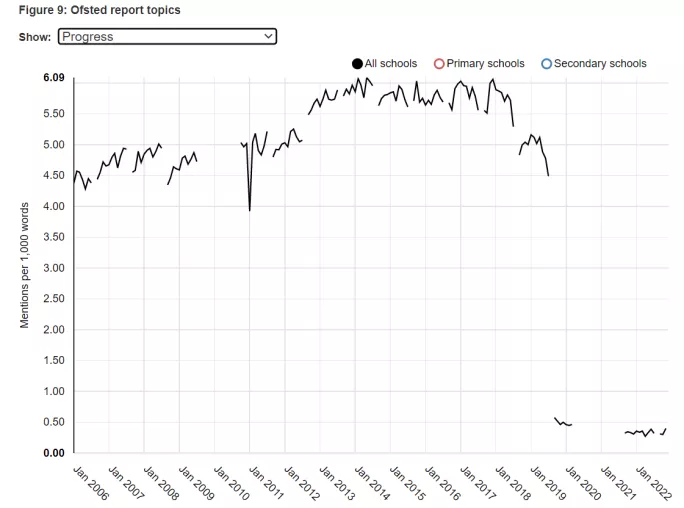
SchoolDash also highlights how mentions of the “pupil premium”, a policy introduced by the coalition government at the beginning of the last decade, have fallen by around 40 per cent since 2014.
Other topics looked at by SchoolDash have risen and then fallen, including “absences”, mentions of which are now back to levels seen during the 2000s.
Mentions of “disadvantage” are at their lowest levels since 2014, and “maths” and “spelling” are both at their lowest levels over the years covered by this analysis.
Another topic that has appeared to decline in recent years is “governors”. From 2013 onwards, the word appeared at least two times per 1,000 words in reports up until mid-2019. However, it dropped to between 1.2 to 1.4 mentions in the data collected since the Education Inspection Framework launched.
SchoolDash adds that some other topics appear to be perennially unchanged, including “headteachers”, “parents” and “security”.
5. Big increase in behaviour focus and a resurgence for interest in ‘community’
There has been a marked drop in mentions of the word “community” in inspection reports after 2012.
In 2009, SchoolDash records 2.6 mentions per 1,000 words. This drops down to 0.6 at various points in 2018 but then mentions increase after the introduction of the new inspection framework.
From 2012 onwards, mentions of “behaviour” increase sharply and they remain twice as high now as they were in the latter part of the 2000s. Behaviour and management is a key inspection judgement in this framework.
Adrian Gray, an education consultant and former Ofsted inspector, said that it should be expected that the inspectorate’s focus will reflect the government’s policies of the day.
“This is something that is debated but the government sets policies and priorities and Ofsted has to reflect that. It can’t decide separately what the priorities should be,” he said.
6. Covid mentions already dropping
A new addition to inspection reports is recorded from 2021 with inspectors mentioning Covid for the first time.
SchoolDash did not include results from inspections conducted between April 2020 and August 2021, because “insufficient reports were produced for the analysis to be meaningful”.
Routine inspection was put on hold at the onset of the Covid crisis in 2020 and did not resume until the start of the 2021-22 academic year in September.
SchoolDash data shows that “Covid” was mentioned 2.5 times per 1,000 words in inspection reports in September 2021 but this has declined consistently since then, with 1.7 mentions per 1,000 words in the most recent set of figures for November 2022.
Perhaps surprisingly, mentions of “attendance” in school reports were higher in the years before the pandemic than in reports published since September 2021.
Mentions of special educational needs in inspection reports have appeared to rise and fall over time. The SchoolDash data found that there had been a sharp increase in the mentions of SEND from 2015 to 2016, and the level then remained constant for a number of years.
The data shows that this then dropped from 2.5 mentions in May 2018 to 0.7 in the summer of 2019. Since the new inspection framework has been introduced, the numbers have increased again to around 1.3 mentions per 1,000 words, but this remains below what it was for most of the latter half of the previous decade.
***
Former Ofsted director and multi-academy trust boss Frank Norris has said that he believes Ofsted’s current framework is narrowly focused on curriculum and this could be impacting how other areas of school life are explored.
He said: “The purpose of inspection should be to get under the skin of a school and really explore what its issues are, but with the current framework and the shorter reports I would question how well Ofsted is able to do this.
“I think the framework was created in more stable times but since the pandemic, the issues around schools have shifted. I would hope to see attendance and the issues around it become more prominent in future inspection reports.”
Mr Gray suggested that one reason why mentions of some of the topics have declined in recent years is the reduced length of Ofsted reports since the launch of the framework.
“In my work, I can read 70 or 80 reports at a time and one thing that strikes me is that there isn’t much room for them to say anything,” he said.
“To take the example of attendance, well if it hasn’t been an issue at the school then you can see why it would not get a mention at all in the new reports because of the lack of space.
SchoolDash also notes the change in the length of inspection reports.
It says: “Looking at word counts, full inspections’ red line used to range from 3,000 to 4,000 or more words, but since 2019 reports have become much shorter, with an average of just over 2,000 words.”
Ofsted has been approached for a comment.
SchoolDash’s data allows users to explore how dozens of different topics have risen and fallen in prominence in Ofsted reports.
SchoolDash said results for inspections conducted between September 2009 and September 2010 have been omitted because “for technical reasons, many of the corresponding reports could not be parsed”.
Timo Hannay, the founder of SchoolDash, said: “It’s interesting to see that the frequency with which different topics are mentioned in Ofsted reports doesn’t only change when new inspection frameworks come into effect, which is what you might expect.
“In fact, most changes that we see tend to happen gradually over a period of months or years, presumably reflecting inspectors’ evolving priorities and perhaps the general educational zeitgeist.
“At SchoolDash, we’ve long been interested in what Ofsted reports can tell us about the characteristics of different schools, which led us to analyse the topics that come up differentially in some school reports and not in others.
“It was a short step from asking what this kind of analysis can tell us about schools to what it can tell us about Ofsted, hence the decision to look at overall changes in mentions of different topics over time.”
You need a Tes subscription to read this article
Subscribe now to read this article and get other subscriber-only content:
- Unlimited access to all Tes magazine content
- Exclusive subscriber-only stories
- Award-winning email newsletters
Already a subscriber? Log in
You need a subscription to read this article
Subscribe now to read this article and get other subscriber-only content, including:
- Unlimited access to all Tes magazine content
- Exclusive subscriber-only stories
- Award-winning email newsletters
topics in this article



